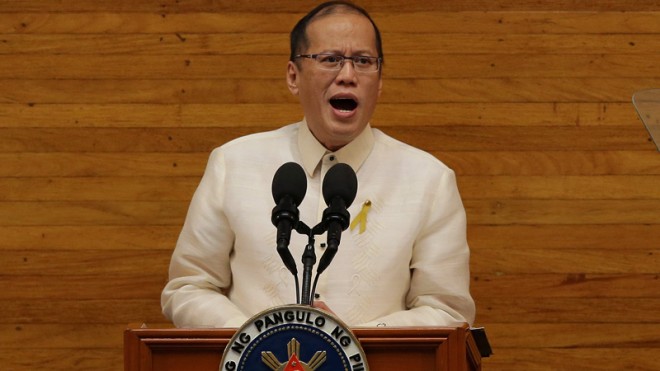
Philippine President Benigno Aquino III delivers his 5th State of the Nation Address during the joint session of the 16th Congress at the House of Representatives in suburban Quezon city, north of Manila, Philippines Monday, July 28, 2014. AP
MANILA, Philippines – Malacañang on Tuesday admitted that President Benigno Aquino III’s call for a joint resolution defining savings was in compliance with the Supreme Court ruling on the Disbursement Acceleration Program (DAP).
However, it does not mean that the administration has given up the fight since its motion for reconsideration was still pending with the high court.
“According to Secretary (Florencio) Abad, DBM (Department of Budget and Management) is still working on the supplementary budget proposal in terms of compiling the reports from the various departments and agencies on which projects that were part of DAP have not been obligated or completed,” Communications Secretary Herminio Coloma Jr. told media.
“Submission of a supplementary budget is part of compliance with the SC decision while the motion for reconsideration is still undecided,” he explained.
Aquino, during his fifth State of the Nation Address (Sona) on Monday said that while the SC declaration that DAP was partly unconstitutional resulted in the suspension of some projects, the passage of a supplemental budget for the year will ensure that funding continues.
“We are proposing the passage of a supplemental budget for 2014, so that the implementation of our programs and projects need not be compromised,” the President told lawmakers listening to his Sona at the Batasang Pambansa complex in Quezon City.
“Together with this, we are calling on the cooperation of Congress for the passage of a Joint Resolution that will bring clarity to the definitions and ideas still being debated upon, and to the other issues that only you in the legislature—as the authors of our laws—can shed light on,” he added.
INQUIRER.net on Monday quoted Abad saying that since only one out of the four issues raised by the SC pertained to the Constitution, the rest could be addressed through a joint resolution or bill filed in Congress.
“It will not just clarify, but sharpen the definition so there will be no mistakes,” he said.
“[The joint resolution] can have a retroactive effect so the funds in 2014 can be utilized to continue what the development program started,” Abad explained.
He pointed out that it may take a long time before the high court decides on their motion for reconsideration with many projects left idle.
Even before the Supreme Court declared the DAP partly unconstitutional, the Aquino administration has been drawing flak for crafting and implementing the spending program. Critics called it “presidential pork” because of its alleged discretionary nature.
But such criticism has yet to dampen Aquino’s support for what was claimed to be an economic stimulus program.
Two weeks after the high court ruling was announced, Aquino assailed the high tribunal’s argument and claimed that it failed to take into consideration the main legal basis of the program – Section 39, Chapter 5, Book VI of the 1987 Administrative Code.
He also said that the DAP had benefited many Filipinos and that the ruling not only hampers the administration’s efforts but also creates a chilling effect on government.
Aquino also rejected the resignation of Abad who took the full responsibility for the DAP.
Last week, three impeachment complaints were filed against the President. Two of the petitions accused him of culpable violation of the Constitution and betrayal of public trust for the approval and implementation of the now defunct DAP.
The DAP first became known to the public when Senator Jose “Jinggoy” Estrada, who is now in jail for plunder charges connected to the P10 billion pork barrel scam, revealed that lawmakers were given additional funds after the impeachment of former Chief Justice Renato Corona. It was the Department of Budget and Management that clarified that the funds came from the DAP, which was sourced from supposed savings or unutilized funds of agencies.
RELATED STORY
Abad to ask Congress to clarify definition of savings

